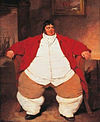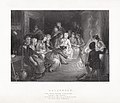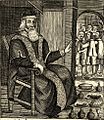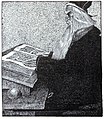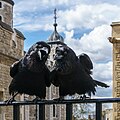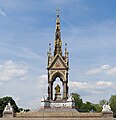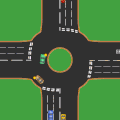The United Kingdom Portal
 |
 |
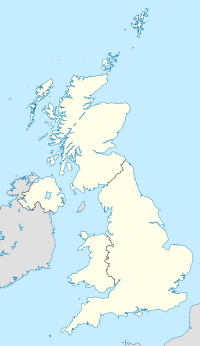
| |
The United Kingdom of Great Britain and Northern Ireland, commonly known as the United Kingdom (UK) or Britain, is a country in Northwestern Europe, off the coast of the continental mainland. It comprises England, Scotland, Wales, and Northern Ireland. The UK includes the island of Great Britain, the north-eastern part of the island of Ireland, and most of the smaller islands within the British Isles, making up a total area of 94,354 square miles (244,376 km2). Northern Ireland shares a land border with the Republic of Ireland; otherwise, the United Kingdom is surrounded by the Atlantic Ocean, the North Sea, the English Channel, the Celtic Sea, and the Irish Sea. The United Kingdom had an estimated population of over 68.2 million people in 2023. The capital and largest city of both England and the United Kingdom is London, whose wider metropolitan area is the largest in Western Europe, with a population of 14.9 million. The cities of Edinburgh, Cardiff, and Belfast are the national capitals of Scotland, Wales, and Northern Ireland, respectively.
The lands of the UK have been inhabited continuously since the Neolithic. In AD 43, the Roman conquest of Britain began; the Roman departure was followed by Anglo-Saxon settlement. In 1066, the Normans conquered England. With the end of the Wars of the Roses, the English state stabilised and began to grow in power, resulting by the 16th century in the annexation of Wales, and the establishment of the British Empire. Over the course of the 17th century, the role of the British monarchy was reduced, particularly as a result of the English Civil War. In 1707, the Kingdom of England and the Kingdom of Scotland united under the Treaty of Union to create the Kingdom of Great Britain. The Acts of Union 1800 incorporated the Kingdom of Ireland to create the United Kingdom of Great Britain and Ireland in 1801. Most of Ireland seceded from the UK in 1922 as the Irish Free State, and the Royal and Parliamentary Titles Act 1927 created the present United Kingdom.
The UK became the first industrialised country and was the world's foremost power for the majority of the 19th and early 20th centuries, particularly during the Pax Britannica between 1815 and 1914. The British Empire was the leading economic power for most of the 19th century, a position supported by its agricultural prosperity, its role as a dominant trading nation, a massive industrial capacity, significant technological achievements, and the rise of 19th-century London as the world's principal financial centre. At its height in the 1920s, the British Empire encompassed almost a quarter of the world's landmass and population, and was the largest empire in history. However, its involvement in the First World War and the Second World War damaged Britain's economic power and a global wave of decolonisation led to the independence of most British colonies. (Full article...)
Featured article
The Country Wife is a Restoration comedy from 1675 by William Wycherley. A product of the tolerant early Restoration period, the play reflects an aristocratic and anti-Puritan ideology, and was controversial for its sexual explicitness even in its own time. Even its title contains a lewd pun. Based on several plays by Molière, it turns on two indelicate plot devices: a rake's trick of pretending impotence in order to safely have clandestine affairs with married women, and the arrival in London of an inexperienced young "country wife", with her discovery of the joys of town life, especially the fascinating London men. The scandalous trick and the frank language have for much of the play's history kept it off the stage and out of print. Between 1753 and 1924, The Country Wife was considered too outrageous to be performed at all and was replaced on the stage by David Garrick's cleaned-up and bland version The Country Girl. The original play is again a stage favourite today, and is also acclaimed by academic critics, who praise its linguistic energy, sharp social satire, and openness to different interpretations. (Full article...)
Featured biography
Daniel Lambert (1770–1809) was a gaol keeper and animal breeder from Leicester, England, famous for his unusually large size. He was a keen sportsman and extremely strong, on one occasion fighting a bear in the streets of Leicester. He was an expert in sporting animals, widely respected for his expertise on dogs, horses and fighting cocks. In 1805 the gaol of which Lambert was keeper closed. By this time he weighed 50 stone (700 lb; 320 kg), and had become the heaviest authenticated person in recorded history up to that time. Unemployed and sensitive about his bulk, he became a recluse. Poverty forced Lambert to put himself on exhibition to raise money, and in April 1806 he moved to London, charging spectators to enter his apartments to meet him. Visitors were impressed by his intelligence and personality, and visiting him became highly fashionable. After a few months, Lambert returned wealthy to Leicester and soon began making short fundraising tours. In June 1809 he died suddenly in Stamford. At the time of his death he weighed 52 stone 11 lb (739 lb; 335 kg). It took 20 men almost half an hour to drag his casket into the trench in the burial ground at St Martin's Church. Though no longer the heaviest person in history, Lambert remains a popular character in Leicester. (Full article...)
General images -
Subportals
WikiProjects
Things you can do
- Visit the British Wikipedians' notice board.
- The noticeboard is the central forum for information and discussion on editing related to the United Kingdom.
- Comment at the British deletion sorting page.
- This page lists deletion discussions on topics relating to the United Kingdom.
Featured pictures
Did you know -

- ... that in 1943, Bhicoo Batlivala led a group of Indian women to the House of Commons to request the release of Gandhi from prison?
- ... that South African nurse Stella Madzimbamuto filed an appeal in 1968 with the Privy Council of the United Kingdom that resulted in the Rhodesian government being declared illegal?
- ... that Liz Shore's nomination to be Chief Medical Officer of the United Kingdom was vetoed by Margaret Thatcher because of Shore's husband's political affiliation?
- ... that the Labour Party received their highest share of the vote to date in the 1951 UK general election but still lost to the Conservatives, who received fewer votes?
- ... that Southern Water was fined £90 million for deliberately dumping sewage into the sea?
- ... that "one of the finest cut brick façades" in the United Kingdom has been partially obscured by scaffolding for four years, as funds are raised for its repair?
In the news
- 2 January 2025 – 2025 in paleontology, Dinosaur finds in the United Kingdom
- The largest site of dinosaur footprints of the Cetiosaurus and Megalosaurus dating back to the Middle Jurassic Bathonian stage 166 million years ago is discovered at a quarry in Oxfordshire, England, United Kingdom. (BBC News)
- 27 December 2024 – Red Sea crisis
- Houthi-run state television reports that American and British airstrikes have targeted the Ma'ain District of Sanaa, Yemen. No casualties are reported. (Anadolu Agency)
- 26 December 2024 – 2021–present United Kingdom cost-of-living crisis
- The United Kingdom's Office for National Statistics announces that the UK economy showed no growth in the 3rd quarter of the current fiscal year, following downward revisions. (AP)
- 19 December 2024 – Russian invasion of Ukraine
- Military aids during the Russian invasion of Ukraine, United Kingdom and the Russian invasion of Ukraine
- 19 December 2024 – Georgia–United Kingdom relations, Georgia–United States relations, 2024 Georgian post-election protests
- The United Kingdom and the United States impose sanctions on Georgian officials, including Interior Minister Vakhtang Gomelauri, in response to alleged violent crackdowns on pro-European protests. (EFE)
- 18 December 2024 – Legal affairs of the Tate brothers
- The Westminster Magistrates' Court rules that British police may seize £2.2 million (US$2.5 million) from influencer Andrew Tate and his brother Tristan for allegedly failing to pay taxes on profits from their online ventures. (DW)
Categories
Other UK-connected Wikipedias
Wikimedia
The following Wikimedia Foundation sister projects provide more on this subject:
-
Commons
Free media repository -
Wikibooks
Free textbooks and manuals -
Wikidata
Free knowledge base -
Wikinews
Free-content news -
Wikiquote
Collection of quotations -
Wikisource
Free-content library -
Wikiversity
Free learning tools -
Wikivoyage
Free travel guide -
Wiktionary
Dictionary and thesaurus


